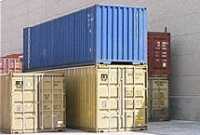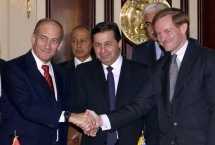Minister of Industry, Trade, and Labor Ehud Olmert said last week that the new qualified industrial zone (QIZ) agreement signed in Cairo between the US, Israel and Egypt "creates a basis for stable relations between Israel and Egypt. It will weather diplomatically difficult periods".
The qualified industrial zone (QIZ) agreement signed in Cairo last week between the US, Israel and Egypt is based on the successful six year-old QIZ model between the US, Israel and Jordan. The agreement, which took eight years to develop, gives Egyptian goods from specified industrial zones unhampered and duty free access to the lucrative U.S. market, provided they have 11.7 percent Israeli input.
Robert Zoellick, the U.S. Trade Representative who helped broker the deal, called it "the most important economic agreement between Egypt and Israel in two decades".
Egypt hopes the deal will save the struggling textile industry, be the first step to a full Free Trade Agreement and provide incentive to Israel to pull its forces out of Gaza and the West Bank. Egypt exports $500 million to $600 million in textiles and clothing to America each year, accounting for 27 percent of Egypt's industrial output. It is predicted that Egypt will triple U.S. exports in four years. Egyptian businessmen pushed for the trade pact, knowing that when global quotas expire at year's end, their textiles will face serious competition from China and India.
The QIZ agreement defines locations for joint Israeli-Egyptian production of goods to be exported duty-free to the US. To win the exemption, the Israeli-Egyptian added value must be jointly manufactured, and total at least 35%. The agreement is designed as an incentive for Israeli and Egyptian companies to collaborate by exempting joint production from customs duties and quotas under free trade terms.
The Egyptian QIZs will be in Cairo, Alexandria, and Port Said. Under the agreement with Egypt, the minimum Israeli input was set at 11.7%, compared with 8% under the QIZ agreement with Jordan. The percentage is calculated on the basis of total quarterly turnover, rather than a specific input for each component or export good, as in the agreement with Jordan.
A 12-member delegation of Israeli textile manufacturers accompanied Minister of Industry Trade and Labor Ehud Olmert on his Cairo visit. The delegation headed by Manufacturers Association president Oded Tyrah and included Delta Galil Industries chairman Dov Lautman and CEO Arnon Tiberg; Offis Textile CEO Ramzi Gabbay, who is also chairman of the Manufacturers Association textile and fashion division; Bagir general manager Ofer Gilboa; and Lodzia Rotex Holding chairman Yair Rotlevy. Israel Export and International Cooperation Institute chairman Shraga Brosh, Manufacturers Association managing director Yoram Belizovsky and foreign trade and international relations division director Moshe Nahum, and Israel-Egypt Chamber of Commerce chairman Imad Telhami will also participate.
The delegation met Egyptian industrialists in Cairo, headed by the chairman of Egypt's Manufacturers Association and Minister of Foreign Trade and Industry.
Olmert : QIZ agreement a basis for stable relations between Israel and Egypt
Minister of Industry, Trade, and Labor Ehud Olmert said last week that the new qualified industrial zone (QIZ) agreement signed in Cairo between the US, Israel and Egypt "creates a basis for stable relations between Israel and Egypt. It will weather diplo
20.12.04 / 00:00
•
More articles that may interest you

Israel Corporation shareholders approved Zim huge purchase and lease deal

Lynn : Knesset Finance Committee should have oppose duties on selected food products

Many apply to manage Ashdod port

Israir: El Al competed unfairly on the NY route

EU and Israel reach "neighborhood agreement"

27% jump in polished diamond exports in November
More news from Industry & Trade Section
>Qualified Industrial Zones: Egypt to sign trade deal with U.S. and Israel/12.12.04
>By 2007, Indian Israel bilateral trade will reach $5b/12.12.04
>Israel–China financial protocol signed last week/06.12.04
>Appreciation of the Shekel against the Dollar will cut Israel's growth by 1% in 2005/06.12.04
>November import figures - consumer durables imports up/06.12.04
>Trade with new EU members up 32%/06.12.04
>Trade with India: Export Institute submitted plans to develop trade/06.12.04
>Tyrah : failure to pass first budget reading will adversely affect the economy/06.12.04
>Israel, Egypt and US will sign a QIZ agreement next week/06.12.04
>Exports to Latin America in 2004 - $1b/29.11.04
